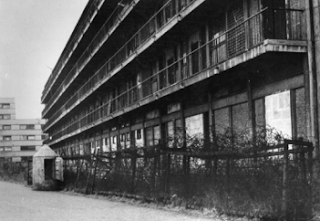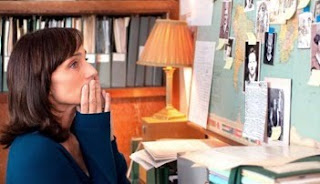 Paris, July 1942: Sarah, a ten year-old girl, is brutally arrested with her family by the French police in the Vel’ d’Hiv’ roundup, but not before she locks her younger brother in a cupboard in the family's apartment, thinking that she will be back within a few hours.
Paris, July 1942: Sarah, a ten year-old girl, is brutally arrested with her family by the French police in the Vel’ d’Hiv’ roundup, but not before she locks her younger brother in a cupboard in the family's apartment, thinking that she will be back within a few hours.Paris, May 2002: On Vel’ d’Hiv’s 60th anniversary, journalist Julia Jarmond is asked to write an article about this black day in France's past. Through her contemporary investigation, she stumbles onto a trail of long-hidden family secrets that connect her to Sarah. Julia finds herself compelled to retrace the girl's ordeal, from that terrible term in the Vel d'Hiv', to the camps, and beyond. As she probes into Sarah's past, she begins to question her own place in France, and to reevaluate her marriage and her life.
Tatiana de Rosnay offers us a brilliantly subtle, compelling portrait of France under occupation and reveals the taboos and silence that surround this painful episode. ~publishers website

The greatest mass-arrest of Jews ever carried out on French soil is known as the Vél’ d’hiv’ Round-up. It involved 13,000 victims from Paris and its suburbs. Over slightly more than two days, the Round-up involved nearly a third of the 42,000 Jews deported to Polish death camps in 1942. The statistics for this terrible year account for over half of the total 76,000 Jewish deportations from France. ~a case study
"The French have tended to confront their record under Nazi occupation with a mixture of denial, silence and myth. The second world war was not on the school curriculum until 1962. Textbooks scarcely mentioned the Holocaust. No French leader from de Gaulle to Mitterrand acknowledged the state's part in deporting Jews to Nazi death camps. It was not until Jacques Chirac became president in 1995 that the French state accepted its official complicity, prompting much soul-searching over collaboration, memory and guilt." ~The Indian Express
 Sarah's Key (Elle s’appelait Sarah)
Sarah's Key (Elle s’appelait Sarah)The Movie
A woman from the present becomes obsessed with tracking down a young woman from the past – for reasons even she can’t quite articulate – in Sarah’s Key, a staid but stubbornly involving drama. Though ostensibly yet another film about the horrors of the Holocaust, director Gilles Paquet-Brenner’s adaptation of Tatiana de Rosnay’s novel uses the atrocity as a treatise on personal survival and new beginnings that is eloquently delivered by star Kristin Scott Thomas. ~screen daily
Remembering the Vel d'Hiv
 A another new film suggests France is finally coming to terms with its wartime history. “La Rafle” recreates the French police’s round-up in 1942 of 13,000 Paris Jews, including 4,000 children, and the families’ transfer to the capital’s Vélodrome d’Hiver, en route to the death camps. It unfolds through the eyes of Jo Weismann, an 11-year-old who later escaped from an internment camp near Orléans after his parents were sent to Poland. ~the economist
A another new film suggests France is finally coming to terms with its wartime history. “La Rafle” recreates the French police’s round-up in 1942 of 13,000 Paris Jews, including 4,000 children, and the families’ transfer to the capital’s Vélodrome d’Hiver, en route to the death camps. It unfolds through the eyes of Jo Weismann, an 11-year-old who later escaped from an internment camp near Orléans after his parents were sent to Poland. ~the economistAbout the AuthorTATIANA DE ROSNAY was born in the suburbs of Paris and is of English, French and Russian descent. She is the author of nine French novels. She also writes for French ELLE, and is a literary critic for Psychologies magazine. Tatiana de Rosnay is married and has two children. SARAH'S KEY is her first novel written in her mother tongue, English.




3 comments:
This book covers an important part of history that some would rather forget, and an incident worth being told about. However, I wish that the author had chosen to stay a journalist and written an article about it rather than writing a novel, because she has no talent for understanding or building human characters, which is the crux of any good story. She also has no talent for fiction, in general. For me this book has the same rank as the Twilight series - a gimmick-y badly written book, that somehow people seem inclined to read.
I found it promising when the book opened with a quote from Suite Francais by Irene Nemirovsky - a beautifully written book about France during Nazi occupation. Sadly that book does not mention the "roundup" because the author herself was rounded up and sent to Auschwitz. I highly recommend that book.
I knew what this book was about and was prepared for horror, but the book opens with a little boy left in a closet. At that point there was nothing left to look forward to, and it took considerable willpower for me to continue. The bad writing presented more opportunities for exercising that willpower.
Let's start with Sarah. Why the big secret about her name all through the book? It seemed like a gimmick given the name appears in the title, and it was annoying as hell. In fiction, good characters are built by their actions, their behavior. But Ms Rosnay, is intent on giving us a minute-by-minute commentary of Sarah's feelings and thoughts - in incessant, clipped sentences. These emotions and questions going through Sarah's mind never seem like those of a ten year old girl but more like those of a modern person looking back on those events i.e. the author herself. She constantly projects her own thoughts and questions onto Sarah in turn making Sarah into a character that seems very fake. She no longer seems like a child undergoing hardship but morelike an out-of-body person hanging around the scenery. If there was one character you want to attach yourself to, it is Sarah. The author completely ruined that for me.
Half way through the book, Sarah's gone and we are left with the Julia character. Then I really had no incentive to continue. Is she an independent strong-minded American woman or some clueless, indentured slave-wife? Ms. Rosnay could never make up her mind and we are left with this pathetic unsympathetic caricature. By the end of the book we know that not only did Julia know about Bertrand's affair, but she had actually met the mistress, seen her children and house. On top of that he treats Julia cruelly and she is already questioning her marriage. She has had multiple issues with pregnancy, her last one ending painfully. She is already past forty so when she finds herself pregnant her first thought is "How wonderful! This will save my marriage." D'oh. Then she races off to Italy to meet Sarah's son and then is shocked that Sarah didn't tell him anything. Don't we have enough proof that Sarah had completely cut herself off from her past. She never even wrote to the people who cared for her, and then she died when her son was only 12! What mother would have told that to, that young a child! This would all be acceptable if Julia's character was built up as a complete nincompoop, but it really wasn't. I guess the author is projectig herself there too!
Great comments. I was very intrigued by the whole Parisian roundup and eager to discover more about that part of WWII history. In fact, just last week they
dedicated a railroad station outside of Paris to the thousands of Jews deported to death camps, very timely.
Here is the link
I enjoyed the two different stories, but was really disappointed to find out halfway through the outcome of Sarah's brother. Probably because
I liked Sarah's story so much better than Julia's. Julia's character was very predictable and hard to feel sympathetic with. I agree the writing was very sophomoric and I actually chuckled and shook my head at parts. However, and this is with a big HOWEVER, I still liked the book. It could have been so much more and had even bigger potential, but I guess I'm easily amused. Maybe the movie will delve into the characters more!
I was quickly taken in by the story, particularly given the very real anti-semitism that is so prevalent today in France. I have always found it so ironic that the French see themselves and their culture as so superior to others, yet they are unwilling to examine their role in oppressing those within their midst - their fellow frenchmen/women. That being said, I read with interest the fictionalized Sarah and her family, knowing that there were so many families like theirs who were rounded up in the middle of the night, disappeared and never returned to their homes.
I wish that she could/would have written this book from the perspective of a real Jewish family who survived this tragedy, as there are so many stories out there still to be told.
I was really taken aback by the introduction of Julia midway through the book - it was a very disjointed juxtaposition of one story onto another, and I cannot say that I found her to be a sympathetic character in the bigger picture. I didn't care for her, nor her domineering, self-absorbed husband. I found myself thinking, at what juncture will she ever take the time to stop and really take honest stock of her life and actually do something that redeems her? Her attempt to track down Sarah and then her blurting out the truth to Sarah's son seemed very self-serving. I "knew" she would end up in the states and that eventually the two of them would reconnect.
I would have preferred to have seen the book go off in different directions, but that being said, I still am glad that I read the book, as it did highlight the history of the French government's complicity in the Holocaust. My hope is that if a book like this motivates people to do more historial research and keeps the voices of the survivors and those lost alive, then some real good could come out of the writing of the book - no matter how sophmoric the writing was!
Post a Comment